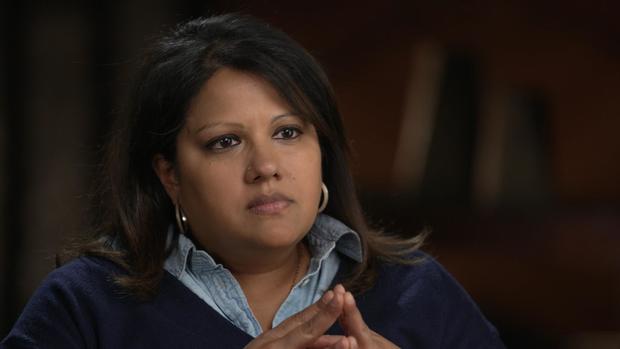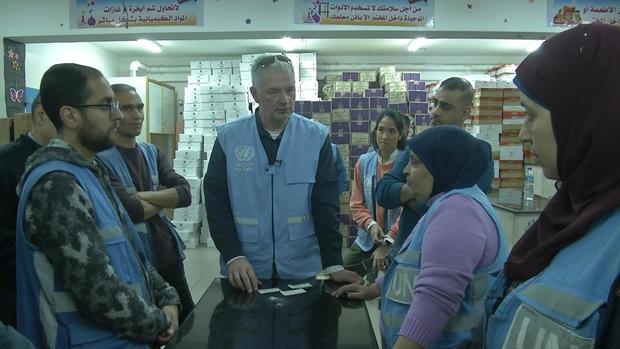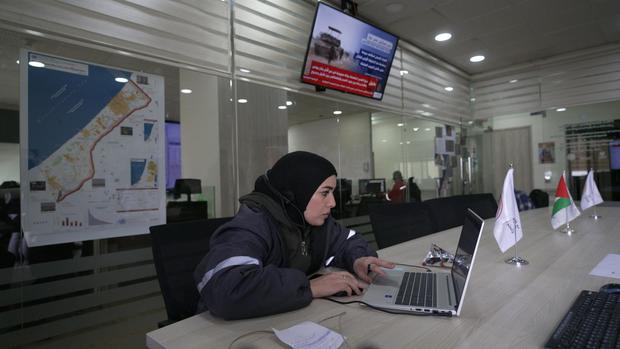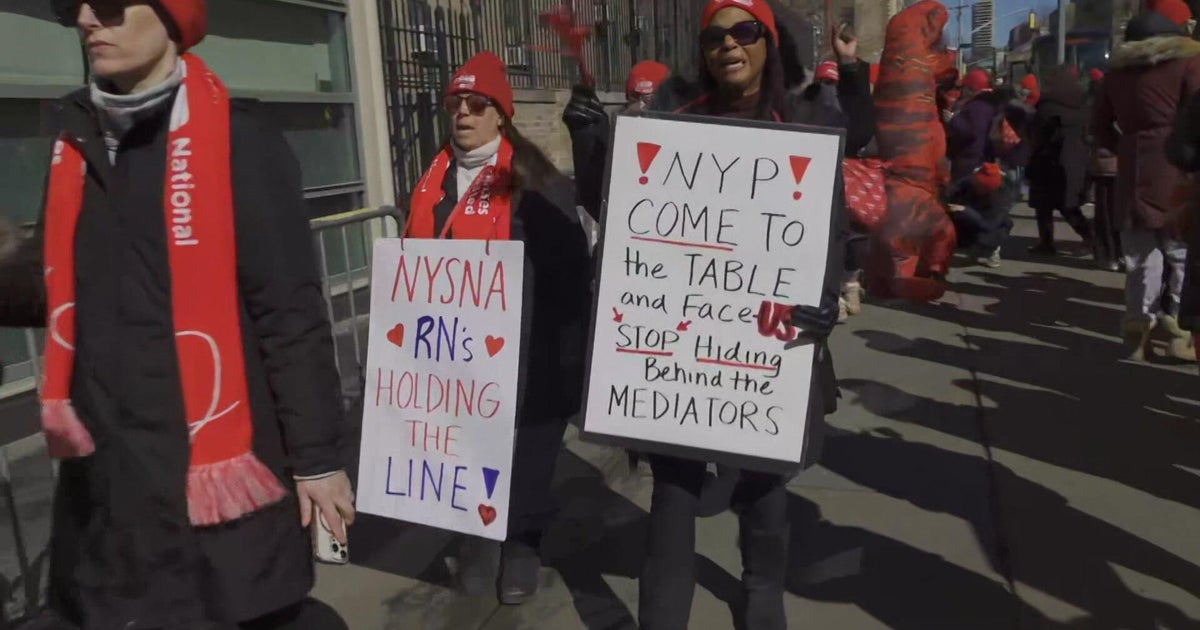Gaza struggles under Israel's bombardment with few functional hospitals
Dr. Nahreen Ahmed, a Philadelphia-based doctor and medical director for MedGlobal, a U.S. based nongovernmental organization that sends volunteer doctors and nurses into disaster areas and war zones, has been to Syria, Yemen and Ukraine. But the American doctor said that what she saw in Gaza before she left in January was incomparable.
What most impacted Ahmed, who spent 16 days on the front lines in Gaza inside Nasser Hospital, one of the largest hospitals in the territory, was seeing so many young victims.
"I don't think I've seen this many children affected in any of the other war zones I've ever been to," Ahmed said. "I don't think I've seen this many people squeezed in a small area without any ability to leave. I don't think I've been this close to the sound of missile strikes — with the house shaking, where the hospital is shaking while I'm trying to operate in the ICU."
Ahmed said she saw children with shrapnel injuries. She said some of the deaths she saw could have been prevented if doctors had the medicine and supplies they needed.
"There are people getting limbs amputated without any anesthesia. That's what we're seeing on a day-to-day basis," she said. "I can tell you that things that we have put into the pipeline to get to Gaza can often take weeks to months."
Doctors dealt with waves of casualties every day in the weeks before Israeli forces raided Nasser hospital. Israel said it had intelligence Hamas held hostages at the hospital.
The hospitals left in Gaza
Nasser is not the only hospital that has been under siege in Gaza. Israeli troops had previously stormed Al Shifa and Al Amal hospitals, claiming that Hamas was hiding inside.
As of this past week, there are only 12 partially functioning hospitals in the Gaza Strip, according to the Hamas-run Gaza Health Ministry.
During the raid on Nasser, patients, staff, and thousands sheltering in the hospital spilled onto the street.
On Feb. 18 and 19, with explosions still going on outside the hospital, teams from the World Health Organization made their way into Nasser, negotiating through the dark to evacuate 32 critical patients, some of them children. They say there are more patients and staff inside. There's no electricity or running water.
More than 29,000 people in Gaza have been killed by Israel's relentless offensive, according to the Hamas-run Gaza Health Ministry. Hamas, which does not differentiate between civilian and combatant deaths, says most of those killed have been women and children. The United Nations reports more than 300 health care workers have been killed since the war began.
Aid delays worsen the crisis in Gaza
When Hamas stormed Israel on Oct. 7, sparking the deadly war, they destroyed the terminal at Erez, a border crossing used in the past for people to travel between Israel and Gaza. The damaged terminal has been closed since then. Kerem Shalom is currently the only border crossing from Israel into Gaza and is used solely for humanitarian aid. The Israel Defense Forces would not allow "60 Minutes" to film there.
Before the war, more than 500 trucks carrying tons of goods came through the crossing every day. Today, on average, about 85 trucks of aid come through each day.
It's nowhere close to what Gaza needs, Scott Anderson, an Army veteran from Iowa who works for the United Nations Relief and Works Agency for Palestine Refugees, said.
"In an ideal world, there'd be 600 trucks a day coming into Gaza," Anderson said.
There is no food for sale in Gaza and 70% of the people there don't have access to clean water, according to the U.N. Nearly two million Gazans are dependent on aid for all their food and water.
"What you mostly see from people every day is they're trying to find food, trying to stay warm and trying to find somewhere to use the bathroom," Anderson said. "I mean, that's what people's lives consist of. It's very much a pressure cooker environment because there's so many people."
The Israeli government has said the problems getting aid distributed in Gaza are the fault of the United Nations.
Anderson said there's more to the hold up.
"It's not just the U.N.," Anderson said. "Every day there's a couple hours where nothing moves, OK? And that's not us. There's just nothing to get."
For 70 years, UNRWA has been the largest aid organization in Gaza, providing food, education and medical care. Critics, including some Israelis, say the agency is corrupt. On Thursday, Israeli Prime Minister Benjamin Netanyahu said he wants to completely shut down UNRWA.
Last month, Israel accused 12 of UNRWA's 13,000 employees of participating in the Hamas Oct. 7 attack. The U.N. fired the employees, but 16 countries, including the U.S., have stopped funding the organization while investigations are ongoing.
Anderson was shocked by the allegations against 12 UNRWA employees, he said.
"Unfortunately throughout history, many individuals have betrayed organizations that they work for, betrayed the values," he said. "We do uphold U.N. values, humanitarian principles and we are responding to the best of our ability in Gaza right now."
He emphasized that UNRWA is essential in Gaza.
"There's nobody that can do the work we do," Anderson said. "UNRWA is the backbone of the operation, and without us the operation will collapse."
Difficulties getting to help within Gaza
Getting emergency medical help to those in need in Gaza is a challenge on its own, said Nebal Farsakh. She is the spokesperson for the Palestinian Red Crescent, which is part of the international Red Cross. At an emergency call center in Ramallah, in the Israeli-occupied West Bank, operators dispatch emergency workers in Gaza — 50 miles away.
Cuts to electricity and communication blackouts that last several days have made the already difficult job even worse.
One operator recently got a call from a family evacuating northern Gaza. Audio captures 15-year-old Layan Hamada describing the chaos around her. Gunfire and screams can be heard; then the line goes dead.
When the operator called back, the teen's cousin, 6-year-old Hind Rajab, picked up.
"The tank is next to me," she said in Arabic. "I'm so scared. Please come."
The Red Crescent sent an ambulance to rescue her. The destroyed ambulance was discovered in the Tel al-Hawa neighborhood of Gaza City 12 days later, with two medics dead inside. Hind Rajab was found dead in a car alongside five members of her family.
The IDF said that the "incident is still under review," but has accused Hamas in the past of using ambulances to transport fighters.
"The story of Hind is not the only story. It's absolutely dozens of calls we're getting since the beginning of the war in Gaza, where we feel helpless," Farsakh said "Because we are completely denied access to many areas in Gaza to only provide our emergency medical services."
Buildings across Gaza have been flattened, displacing nearly 2 million people from their homes. Some have crammed into makeshift shelters, where hundreds of people are forced to share a single bathroom.
Many have settled in a sprawling tent city in Rafah, on the border with Egypt. Around 280,000 people lived in Rafah before the war. The United Nations said Rafah is now home to around 1.4 million people who have fled fighting.
A member of Israel's War Cabinet recently said if the more than130 hostages still remaining in Gaza are not home in two weeks, Israel will launch a ground offensive in Rafah. Last week, the U.S. warned Israel to refrain, saying it could worsen an "already catastrophic situation."
For Ahmed, the doctor who worked at Nasser hospital for 16 days, it's hard to imagine people could endure even more hardship.
"Every day, they hear the sounds of missiles, the drones, these noises that have now become somewhat normal for them, and yet are a sign that death may be around the corner," Ahmed said. "I will never be the same. And they have experienced this for over 100 days, and they may never be able to get out."







